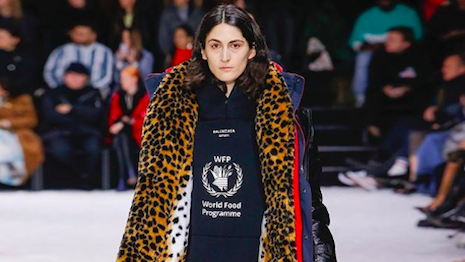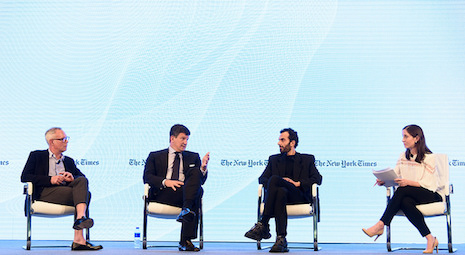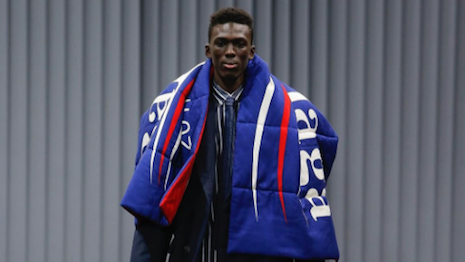HONG KONG – Buzzy fashion label Balenciaga feels it has a responsibility to use its position and popularity as a platform for causes it cares about, according to the label’s CEO.
While luxury brands often stayed out of politics, Balenciaga recently waded into partisan discourse and charitable fashion with runway collections inspired by Bernie Sanders and the World Food Programme. As a panel during The New York Times International Luxury Conference on Nov. 13 discussed, luxury brands are wading into political and cause-based discourse, which could be a potentially risky move, but up-and-coming generations of consumers are looking at a brand’s values as much as its craftsmanship or heritage.
"There is a new way to be a luxury brand today," said Cédric Charbit, CEO of Balenciaga. "And I’m pleased to represent all the brands that feel that being a luxury brand is no longer about heritage, craftsmanship and creativity.
"A luxury brand today is about of course the heritage, craftsmanship and creativity, but it’s also about the values, what we believe in and what we stand for," he said.
Valuing values
Mr. Charbit explained that Balenciaga’s recent pushes in cause-centric fashion were driven by creative director Demna Gvasalia. Since joining the label, the designer has helped Balenciaga gain hype, which the CEO said comes with a responsibility to promote its values.
While this messaging could be seen as alienating to certain consumers, Mr. Charbit said that the brand is not seeking out controversy.

Balenciaga's WFP hoodie on the runway. Image credit: Balenciaga
Along with social causes, companies are wading into sustainability, looking to change the status quo.
Lane Crawford Joyce Group president Andrew Keith said that his company has found that empowering its employees to challenge or adapt processes has led to sustainable progress. For instance, a new executive taking over the warehouse noticed that the hangers used for transportation of goods were creating significant plastic waste, with 300,000 hangers being discarded each year.
The company now has given these transit hangers a more cyclical life cycle rather than discarding them after one use.
Beyond its warehouse, Lane Crawford is working to create changes in consumer-facing fashion. Recognizing the impact of its 3 million shopping bags per year, it has now instituted biodegradable packaging.
Sustainability is not only guiding consumers to vote with their wallets. It is also having an impact on what kind of talent companies can attract.
Mr. Charbit said that all of Balenciaga’s job interviews today see applicants asking about the brand’s sustainability policies.
Values may also impact celebrities' and influencers' choices for brand partnerships. Steve Hasker, CEO at Creative Artists Agency Global, shared the story of a millennial actress who turned down a multi-million-dollar endorsement deal because the company’s board members supported causes that did not align with her values.

From left, Andrew Keith, Steve Hasker and Cedric Charbit with moderator Emily Steel
Getting into the political can be a dangerous move for a brand. But sometimes brands can get active without treading into risky partisanships.
For instance, the CAA ran a campaign about voting, which encouraged political activity without taking sides or telling the audience who to vote for.
Political pursuit
While many question whether brands should comment on social or political issues, research shows that for Generation Z, social justice is the way to their hearts.
In an era where social norms seem to be shifting and important social conversations are at a high, a study by DoSomething.org found that 76 percent of Gen Z consumers have purchased or are open to buying from a brand based on the issues it supports. Many are now even seeking out brands, rather than finding them by happenstance, based on social causes (see story).
There is a significant correlation between the desire for luxury goods and political conservatism, according to a new study.
Several marketing professors at INSEAD published a paper called “How Consumers’ Political Ideology and Status-Maintenance Goals Interact to Shape Their Desire for Luxury Goods,” looking to establish correlations between political leanings and luxury consumption. The report found that conservatives tended to desire luxury goods more, which the paper attributes to the desire to maintain their socioeconomic status (see story).
"I think that fashion as a vehicle to bring awareness to political and individual change is absolutely fundamental," Lane Crawford's Mr. Keith said. "And the more that fashion brings this power, that individuals can change the world."
{"ct":"IsWtSL0w+\/a99M33QufqBxa6gYs+gAVGA9Jy6gQ84BV9U+vpig8U9Uq5X1Yu3bdRFCdlmebkEtuAv0ey29bFVbWkZaZ4nH7I+ZomHm0Y3aGM0PD2E9uh2nBp06seSrkdBXJJDMFGVsePTxn87pGx2\/yF1xtqa1FBgH57gK818NedCtl9nDw6It7GABle2moJgAhUdq\/sInUlvFt8nLV7lXzlzmJU7oXLFqj941KWTEEkMw6aY+oYnhniqPLSAxiPUYXP6clbTKjJ17XcSrcKgrDQQ31vmIbgjAGVpHl3BtLHy9GMOzKwhnjjiRNQAVnRFXNWg9aziACAlnZdQf3YwCbcVBlBDB3iMWAxzXemU\/bx\/2gwdBXYACrNtOuZAwsuJibunuBhyTUDNuM8tm4Y5ogY\/HuGqBMEZGCt+6qMVeLD7Y73ajkiIbr+VARQVGDmRk2CCG41h\/p\/ipmC6hgM6+eqQGDRfduUw3uQMafKHuUPNn0bubKbJh9ulUcyiQPux4+ZplvxfoE9ttLv8K9xzixWd3K\/ftiWQFdoaNHKiOIYT1BDUL02tKOVDcbxjRwbnwpU8rvY7BHvoOoCtoMVXfGroV1c6jlyrONdqn3dNcptrlTOSYeP\/JF+Lk6ihCRA5Rw+BPzDumDjjlVmV8dwwZOETpmQiukQzyjMzwoWcwKCh8Coh6ICMSdU9ViJcDxr7ZGVq2BwDsSZara1VwUHu+kdqpJU72KfqEdamG9uxgeXWgA2g+2wzHnIEVk\/V8pQpHYGf8rJpv7a6SkfBwwynlCQOlZk5RTkBNFa9bIaEW72z67MqVOqlL845pImommbaXGaWpMfBYE3f\/yGQzT+GWN7Otfs3jJaNKWEjAmMWkbmeRTuirLQ+YcrWr3H7\/sxu7ZC+XgMzZxprMi6vgJxcpLDReJo7Jnac+JWEkFp817iZoTRBfzv9JOijJE+DqB821erDI8NMagklDxAYYdcQBQVML4Po4BNnm93zsSr7+E5VFIQyE9ZqBHKxN8SZDMWTLpRM4ccWFmFMeI5I+q\/eoAigFU1IXG0X411xz1SCZXS29qXDb9DYFF9MXEEFqo50AFSxNtF5AKIScKCvnwzrfvpNomHe\/VC9yLwMTDMWGdp9MDaOaDIGkglAsw5QnIoeIoe7sqZCxg1iEl9hAla\/sL+VRbdY6ilFH7IHFXVHxobatRkgny14mA6ha+\/pS2QxqWr67Eg2SClRjzZmlM+i4kFYWBhuhd2D4ynloIvPqiZ0\/Dc2+50UTnN+fJ7qd6jrt\/EzLAGLv6obgLKikfCCKEQQm8+EumlrIkV39i7Usqhdr2gDw6XmXI1VHIahtSZOBhT5h1xDUhyEx+Iha8zEpfZBSyOuCqlpavepDURVUtq6z89IigX2VX7JhouiqD6ZNjF3QWgITX2hRtq5IxwHs3XMxzWxnkiybrmd4cgfB3C\/noTAbIwGlvw7BCB\/3y5\/Xfa2BXavBjCs1dhBCEsMk0WCKC9HtQhZN391oL1DZ6YifDThB4AJOov2vB\/J16vwthBr70fY5uQNt0dat49HSzLnpVpPxUgcMJ7hF8vbdL0\/fsqk6jzcf3S0iOHORPgwzjQdLCVPkoZEPBtA8Q28P1WhU5SYnONbJk\/68UHY4bDzJkl0z1NQuOxGql1Y8\/seSvXDqSWS30q5ZBH8mPMupx5fA7+aNwQIr+w9nVdFQlfLsBZwMT\/J3zJOg49l+ZXTi0GWzDNDczlJgOeKvekd+AEvUlldiNiPxS1MMChGtr7GfxhjMRE8lW31+yoDz1sSfoBAUQX4ANFgu\/PMgMH7jmSfIP9\/0q71+LMWXN+EoNdR9QoVf1lpmcS7mlOihsHAa3Vh3J9+cEswDcWpBUQFs5HKOS4L5t3LZ69xvjt\/K6f6BhJbixH0xia4DWJ5YEOp+NI3zUaDKI9y0O7HFDfYMHOuvG+5G1vRawF40L1UOrod9VyV5zoTSQzPj38eDNW7pO83jviHdJPDZxqZdWs5r7\/vsm12kk+FOGLMniGCe9ZZ6zgimNmy\/vojQxZInkEBVeXpaZTHcVeI6aTczWz32ODsFHBIFslK3\/4iq8p3s7uquxWe9EZxFFORwTUbP71CpRLD3eawFnZPCftC5pXLiCNbag1+PEhmcq7WCNojk5flGTnhNACcD2Q1LVl3OHRc2ZSBJq298SmxMUJA6pEnnw\/7dzq2zY3kyLGI\/wkxV\/Q3dyQ2TKcZ9WfMrQzs3UnF7jdDbiS52o6T3ATR73rTSVbormHTnfmjLSS8Xfl74f6GSK2PXoVOoYQ+0A2By2ilPp60j1h7STFK+ut7jEewJL+9+Z3993UMdCu3W3Vn+Dd7CG69bnQd0aWOSacL\/MSFINy4g3oJjwOEc5fyI8kkBilY260IRmTIB4LpIjR2Tn89c7PRvrEXc06mCSssjvJGb6lM7S0Yb8AbraV4hpVtfQwiBVgc91NdpzdwER2Fcq6g7lquc+xk84dt9lqDouTB2i0pRV2QZN9Y83M8DJKEYxZZ1EH0Greq6kADjEFhly\/CE4yXUtaH7\/oJDlEP\/ejft9qu7+7fh\/NBznX5Ve\/TwuyL23fEHfMpUqhQOrGTxwlebAMxPSuB\/ddEfXoep7hbfsY4D+LuyNA6SGbTfLZAVQv56xo5jPrBo2YlBPx7jjhFgkUPD5sGD180+4+0aSHXRRwzN4ShWkwrXVVN+xE\/yJzGwjX6Xh9Uw4G4mbZkz25Wd8u5UUkdLJxpjZJJoaxXkTM9nhgzUe\/NurqcO1FonUO4nB5D4odgr0bp6qrL1bqRDpJS2nWbANxqO27qPTetWlzFzaU8p8GD8haEsP8p1rPk634W2LSjoqXZlWocJYQynYmibBR4i2ECwCBQz7fvDIlvHHVvg8YAVfrqwi19KO\/q1DEUmg5ngz2nhsSUK1fsJJg1NQLpaiS4SCu5QHtIERIT7Dng1cyxog4LHaDE36kn51WStKmitTcs5XripiEperwkcMtNxf31yvp2zHpDnow15AaMrETtoY3LciragEfNumuORrdUq6MSeiF6yzolypeHRrail6cuy7sojmtPQhfxYP5ApwktPEkhRlSE+IvbERDdFch1iQnK3+922xLbXskCL9+bxZX4y2lZbdueF6jqwPrksTKSoTo8wXUoDk6hSvJmptX36cTgUnZNQ++7wb6\/bkcUfMU8IurbobS68XelIoBIKpupLtrArkdsPXOeCEkVcxLcfMs1SF9LMN7VHbXr9PXM0LKNnMWrnX5Hb8nw8f0J5V7DyM3NYuRYU+yvGfAG5CmigciJZo+fc0zgmmOE5hJSrCUNNS5\/fWiMOvYKd7H7VuDVqjDRmIzum4NA4esuCaMfzcuFaM3amQnTATMg1HZS7j4v8LVXwpIsj7wGY8bSyCioqnqu5iL52bKAk1ZykB1zEZgMiAZ\/1QJyD\/rH4jFs5avk8RQjkD+LHtaBrBRhIq8OM\/pEo9sLrJnukPXcqrMjh67KYQknbobtRm43DhYVr343Sfce+FOCijIRSLljCGcoGv\/w20a6gsRva4auXdrxwZhMEdUQektVUo6AZvIAOPkI8hIR2ehuYOX2m55YvPiQegVtqlFOb1oo5mJstIsx8EWk73ruBUrSuTu\/XmyOd94OK3GenNYJ+7UBrEBvXYkq1Hm8WoIjzmitLgAeWD9QiEDOJ36YL28tWhlqOWxUYhR3UhxEci\/Kd9DJFYdWJEhFA5L82gMkk0LpGlN6OkZfhqtdpx\/vQeb\/0KxwTb8fKJgdTTOsmrPToX2uVCtjlcboq4OOczs7vFyIDyWCoO3fC2w0gsqDcEGYcmUzwKvvq8wyMGfgjuW1m4i7Sy0+hLINWlC9taL5eTB7J0g4+YdoJ125bB9+z4VH4ZGpimn8r\/NW3jlOkq\/Zpfm5TdgmljPqBnXGz8WgYZK27I3TtTqsBsIN1pvk\/qOAZ4tiv0iClP3U1Ay1\/M6bu5AlrqDnR5Tn1AFxJBK0nbtQEuAgMv4con2TxOJOA1TUuImTLUXsLLw3jDfwR6wETIcIy+5kokW3MKSng\/D\/UqhnoQEYMffzJSRDxNNI9YxUMTXhDX+T0CYutFntRVFVepi1C5FKvW3MBdEEaeYkIyVd48LVN7X3pcwFwu4Xo1+Fh1lIjavTlKJA81zHbFdaL5SbS2YWsh1EkuZjeL\/zIL8VF+eUewA8qsBkRD7f4ghHS9iEKTDtSjfzRrgINhDnOzNVyrDN0rsoPKN3aBccLkwtI8kOyiVVeWAssqR2qi7UwyCnxxyUAgm6AW\/6WuSxRPyM4atuEFpkanaaZz4ybJf3XDsb6awzmImUe2wzmhpLI3yDny\/rzkkorVw+tUzp\/yxxaqSpupFffQGWIh0TjVZX2yrGdX9YgqBueVPc0krf\/m2OyJ8RsSsfpkZs5ObBgv1WX5mgVAmOwvuY\/SNlNJ5pvGbbsVyv+8+Lfw+iupeqT3DEzjKx6zPJ4ALi+3\/C3PfhLMnNXORnPlqpP60NBceevQbCXvXwul5dEgU4AYChrZqwhQpYsQjVU25YqaUtYh1Xz9m+\/EsPOuk7NCrZuZuBfYXNUKTd4ccAOd0utV7DvzD\/gnI08nJtW6RGUlvz69Tv65bjPbLHaA4PCvRQnVJWd3p5YzXx2G2BH2W5TlXQfvdAPEMLTwMYXNwk2OoQmmKJE3IO6M9dKoPURzlN70\/55Vk6NjmtR62McueBe2y52Qv9ThAggBg4XRNegjoL8N0qdkRSW3rZQhShTbH4agBUJZkVvXK\/gIQ1XyWixT8A9k6FjOxKgtvRWLbHVqGOH9CsFU8JPZXciIp+SmcaBUWakaFtY4ODxIX8KDoP6ndHR5+zY0x362eddPF3PbbIU3TuIyFCZKcs6nSSmHIYkVlR2klCsLXy9e9o0G+rxziR\/ENjSJ4nUhEAHLyW4LUMtkpinmIhOu0d+\/pn8xevWwsmC4lER\/U+AfAVHyKJ2CqsysOSXOZPPECkdBq6O6+IksHTubsRJg+XT1kOIbONXMwz8Yg1RSExdtRjfo2R1HtRrlf+Sl0LmRY9h9tcNsMavWwauCGgeXW6t0uW0B8KUlffhFhlLK+Tr05d\/afsaS3qtU8cddLevKqHvg+ohwqEbrhJQwKFXuv++7YLQdVVgOv4QCXZthi75J4Qq1aroDBX4kQXSgFeG6TdPoBtJGmRoDEc1tFtHzx\/5cB3TiYJyWjouHS4pfRbogg\/qO47bc4Z8iNNgDikirPUSK9vuLZHKds6I\/zVf\/Tn6mGYWbPyGYlVb9Zy53FktMDu+31InOEjNSeCCZQnjJxNGMXochy5Q+5a5MPMqiF5Sdx7TBjNpx3peNK3ZWB7Ze3utxj4oh0mGJmyH67UuTvlIeYG0aCFNrCIcj2b+1Y7Wix0e1ZxjEwYKMgVEynkSyhjlJ7tqWumALsf5MOm1jZFy8hH6hqTCcAFFqfV1syEOLM8CiDYouhOhWXL\/j6\/EZX7ODjJAqXs2M4tm7E7ZGIh7+BnZvsHq0qfRg4YWduQqB3mRc2Vo2G5ZbZ0nUKJxqnQph8brZv0agFLEShup3aThmFZWyx4PsNNcW8bM1BebAw5nh1QRKMo\/TzcK+bbf25LT4XTq0s4iooV+8ScYPC25Arnd7LmVHcfzPN8NMZAjoEac0ClKOEZeiT6y\/frI\/39HCf5a0sAE+fjSviY6pSkP34ZVWdpcB+3uRDE\/XyNA9bdrWRRcxujWRXHMHDzVZLRi+SVOaG\/UE23UOtgeE3uFq5OA3PTN0GnToNfySbvLlk7P68cMl2b3d8AN\/3WcGYZrlePG4lj03ditkMzKvp\/rPqtvd4PeP5fqozEF\/PvdtOxdPGyq3tCtTm3go\/fT+yObX\/qAJhaD0c067aQ5PhJWlmyHnvcMu4aFQ239i5mz59exrPDEwOESw4EqMZRHnJnUsqhiJjn8ctxHq46Y0eAwlgzwnUHSwOeHaAVEEus3OOTU12ys9OtFxZa3wDy\/KbqcO7\/07hWzRoD9PlgTr\/hrJnp4j4d3TlPpBeigiAt9TVg56m34o0zZ04maZ\/cetY1kPbpa5wf0BsRcXVeR\/TaSlk2cosE4oeUS4129kJtmxBGTJDsbcwt+4\/zAxbvkV1EMcEE3Bhe4wdiRVPP63cLRe1ZB9ptx7u934eY5TUcAibdKp4QAzkAIGrjGonljJYvxx\/m0LWLEpdnTKz4teFIQxj8\/U5iWz33J3sMs30PzFg7WH7KfMaSlnF1aLWV0wEENEz\/NxnRCuEqiRnActRERJZkYict4lFIb1UULBy8QSstwT7+p6353wYbvJq67lsQY9\/wDrvmXEa8O4sQKtK\/VEMTdNyBZLbn5AwR0oFrlrSqNc\/ks6uxeW\/rufZnlEPu0kN392UVzq4cXxBkknu6Dd5kdCND9vVNQ\/Fh2C2y6w17NoRq+dQ7JtsznEohPQHWqgLD\/ufJ8i7Td7ml0gmzTlRT6x4aLlAplBFGNzC+JmKR+KVZwV3AcSqMgH5wpObvJ4YOHdfX6S+MgOxYEDV2rgYOZV0at\/XiEjgFdEK37DmJx7Hu6IvRa4yi7n6Y2\/DJEWwQaQ0MDs0upObkIplP57gd69ZvPMom5NDRJIIoM7wUmeo4kWOKNKKozN2Qmm47gm4+A7fKi2NJ\/b0K5hELuPGqgHDuhg7XX9eyEHWN\/s\/wKOCz+i0ArKzBKzKZKqyyzWhARPb58mUOMEypp1vqKOoHhnd8H05OzzcEGBz5qsAWXPwNMfZXRGiVNz3KnDMRpi1Ht86e\/ntaCFeBu2DEez8Fw1pBGGczRddHVHybnkMWKGKi7v68jGp+0lShFNY8k2W\/qyX+8GvWGQ5Izp2QqMxDh5EunMC71HiDdzRWJaXUg9KfCg3d9Lw5FsfxhpIqcmcq5VD2s07Wtgqx9dP3+tLGxNAjw2iRvkEPNN9odOrfox2pTVuNtKrlPDfDk15io5kqBnqSqT\/VCOWXXBSwzuV9mARIpzCJzQGApPWlccpPbNn1+B6wZ\/QUhcQgWdiHIbmDRJ8\/C92IcwlaDPAzMdT1jJLCX9I0VPBW7PsW7YYJaM6nfiibiuNQmshk3R0fVDAYRjCSVGGjhsTsrgslBJM5Z4BV0h1gwRcVMSs30haGYQ4G4+fWof0xLsSDMM6mmidH996+mTafi3jkLqbr3FK4\/O+YtDFhsKP2Wbz6PXymt4Y\/o8SwJyaOeF01mddws0VRgSRDkyWIOLBO7dqFnWHT4bZE3aLtVVym1QRsjIaDvRBPEtwheGvSKjlSuQXXOCHYGv+PF39BRZauSHXRDs\/rz3FdxK5Xw8NNXGceKtkuYj26I3WFLr7VXjnbgj1+AVb2V0QTu7y58KNexWu5yjCNo00tKV8qn+WhvGRwHrqueeYgUFbGKlbDdHOus9TmNyUqEXeJrZ1j6yi4mpA3UDRhKdW2uSqhWxk7fFCiE202W9DJ2JwLWSCch6MNEjE9tY\/7mzgPkIltf8eVGL150NsG00wuyxLR5lAakEtHsbfkvzuioxHPzZsg+pUb+rfTD+r8Gss\/FwgxNDt4\/UAfmF5Dwf6yvogQsf\/\/S7pe60Lg+yZ7wDd0rLrBcOV56Bno9okEHz7xW\/t\/mP1I7i5hXd8oPYh3wPku2uaL\/52nKnTtb2T1dTn4OiCBslBQ0Y3rXOu\/OY2304jO0ab1uqQ2ZDQUObhD1I7pIctsLLLCtcHOgKAysESdW\/4TVcsnHht7jy0H2t\/qd7W\/aFcZiDnO8kzF\/ZYuoy96KdSn6Ad\/4DizNZB4n5omtBSHEo2iasHMBF0c1m9nBOEG3H+6SBYxFBqWvHpkyk4JRk1SOH7H+XSC+F3TjsgJXMVL2xUq6rv9N2XE5T3WsXmKeg3KCYi3UOU49ir+2iw7IPj\/AA8ex8foLrZkPCkzPF94cq4z69OhK+jlZL3oN0BQCWufqoxO11LhV9Y4WRpuVS\/D9GpaCpIwGSkY2A\/wmePXcsJBdN+fgtiUeSZJHwCZkEo1McErftk15SrZoY6RvDCLQJeUGkP9YUxEVta4LMp7+Jh7u9QmaI0N+GE8HMHiWAnd9hlcZxYPmq\/VLwcHZCABQu0NBhPuOWiZHZK29kHyNTHAc2B\/R4hRUYaBv89waHm5Z16QKRsGWkLrBoFinngAMpscSD\/9UN4uEN6MJkc82v2gIaj5k85tas=","iv":"c287215e13adddf4ff015dd1781ce9b5","s":"d2d1bbb4185aa3f3"}

 Look from Balenciaga's fall/winter 2017 menswear show
Look from Balenciaga's fall/winter 2017 menswear show